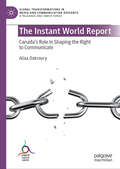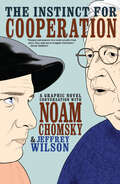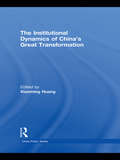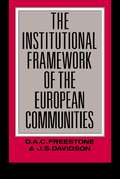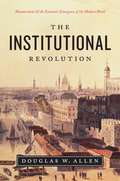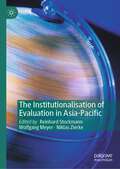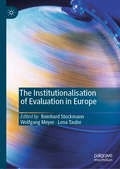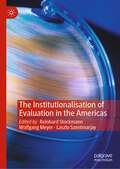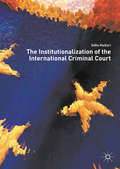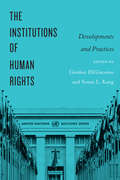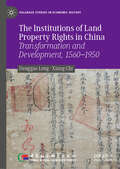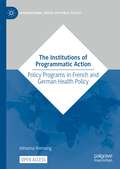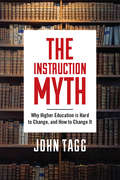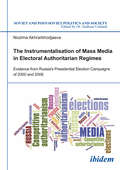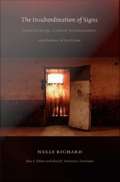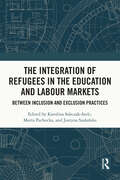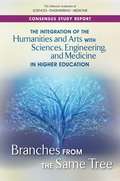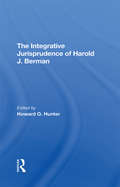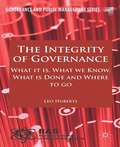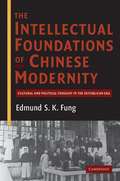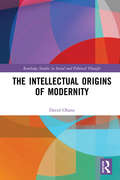- Table View
- List View
The Instant World Report: Canada's Role in Shaping the Right to Communicate (Global Transformations in Media and Communication Research - A Palgrave and IAMCR Series)
by Aliaa DakrouryThis book proposal focuses on Canada's pioneering role in shaping the international understanding of the right to communicate, particularly through the Canadian Telecommission Studies of 1969. The study argues that the 1971 Instant World report, a landmark document, has been overlooked in the existing literature despite its importance in the history of conceptualizing and implementing this human right. The project aims to fill this gap by exploring the historical context of the report and analyzing its contents, shedding light on themes like privacy and indigenous communication rights. Additionally, the manuscript highlights the unique contribution of Betty Zimmerman, the only female Canadian member of the MacBride Commission in 1977, replacing Marshall McLuhan. Zimmerman's insights become pertinent not only for scholars interested in the New World Information and Communication Order but also for feminist studies, showcasing a leading female figure's role in Canadian communication and cultural policy. The research promises a novel and untold perspective on the history of the right to communicate, addressing gaps in international and Canadian communication, women’s studies, and media policy literature.
The Instinct for Cooperation: A Graphic Novel Conversation with Noam Chomsky
by Jeffrey WilsonIn the tradition of Joe Sacco's graphic journalism comes the first interview-based graphic novel treatment of Noam Chomsky's political ideas and activism.An astonishing graphic novel that brings Chomsky's political analysis to bear on real people's stories on the frontlines of America's struggle for economic justice and human dignity. The Instinct for Cooperation innovatively balances those real-life stories of struggle with conversations the author has had with Chomsky on how best to understand them. Although the themes are wide-ranging, this book is ultimately about the importance and need for spaces of resistance in countering state and other institutional forms of violence. For example, when discussing the removal of books by police and sanitation workers from Zuccotti Park in November of 2011, Chomsky paused to say "Arizona knows all about that," referring to the 2010 ban of Mexican American Studies in Tucson schools under Arizona House Bill 2281, which deemed classes that taught "ethnic solidarity" to be illegal. Rather than footnote the reference, Wilson tells that story. Like Joe Sacco's animated political journalism, this book offers a unique perspective on current issues, while providing a major contribution to the understanding of Chomsky's political theories.
The Institutional Dynamics of China's Great Transformation (China Policy Series)
by Xiaoming HuangThis book examines the role of institutions in China’s recent large-scale economic, social and political transformation. The book argues that, although the importance of institutions in China’s rapid economic growth and social development over the past 30 years is widely acknowledged, exactly how institutions affect changes in particular national and historical settings is less well understood. Unlike existing literature, it offers perspectives from a variety of disciplines - including law, economics, politics, international relations and communication studies – to consider whether institutions form, evolve and change differently according to their historical or cultural environments and if their utilitarian functions can, and should be, observed, identified and measured in different ways. The book discusses China’s political and legal institutions; the international institutions with which China engages; institutions promoting science and technology; media companies; and local institutions including the household registration system. It also examines how institutions themselves have been formed, changed and re-formed over recent decades, and suggests theoretical and methodological adjustments in institutional analysis to allow a fuller understanding of the institutional dynamics of China’s transformation.
The Institutional Effects of Executive Scandals
by Brandon RottinghausWatergate, Iran-Contra, Lewinsky, Enron, Bridgegate: according to the popular media, executive scandals are ubiquitous. Although individual scandals persist in the public memory and as the subject of academic study, how do we understand the impacts of executive indiscretion or malfeasance as a whole? What effect, if any, do scandals have on political polarization, governance, and, most importantly, democratic accountability? Recognizing the important and enduring role of scandals in American government, this book proposes a common intellectual framework for understanding their nature and political effects. Brandon Rottinghaus takes a systematic look the dynamics of the duration of scandals, the way they affect presidents and governors' capacity to govern, and the strategic choices executives make in confronting scandal at both the state and national levels. His findings reveal much about not only scandal, but the operation of American politics.
The Institutional Framework of the European Communities
by J. S. Davidson D. A. FreestonAfter more than a decade of British membership of the European Community, there is still a widespread lack of appreciation of what goes on within the Community institutions, and of its significance for UK political and legal processes. This book aims to provide a concise introduction to the institutions and law-making processes of the Community, and to set them im their proper perspective as part of UK public law. The prime focus is upon the Community institutions and their inter-relations, however, reference is also made as appropriate to the effects which Community decision-making has on Westminster and Whitehall and in the English courts. In particular, the book examines the sources of Community law, the organisation and composition of the main institutions after the accession of Portugal and Spain, and the decision-making processes involved in the enactment of the Community's legislation. There are also chapters on the budgetary process and on the role of the European Court of Justice. Despite the UK emphasis some comparative material is used to put the UK approach into perspective. To enhance its value to readers cominig to the subject for the first time, the book also contains the text of selected articles of the Treaty of Rome.
The Institutional Origins of Communal Violence
by Yuhki TajimaWhy are transitions from authoritarian rule often marked by spikes in communal violence? Through examining Indonesia's recent transition to democracy, this book develops a novel theoretical explanation for this phenomenon that also accounts for why some communities are vulnerable to violence during such transitions while others are able to maintain order. Yuhki Tajima argues that repressive intervention by security forces in Indonesia during the authoritarian period rendered some communities dependent on the state to maintain intercommunal security, whereas communities with a more tenuous exposure to the state developed their own informal institutions to maintain security. As the coercive grip of the authoritarian regime loosened, communities that were more accustomed to state intervention were more vulnerable to spikes in communal violence until they developed informal institutions that were better adapted for less state intervention. To test the theory, Tajima employs extensive fieldwork in, and rigorous statistical evidence from, Indonesia as well as cross-national data.
The Institutional Revolution: Measurement and the Economic Emergence of the Modern World
by Allen Douglas W.Few events in the history of humanity rival the Industrial Revolution. Following its onset in eighteenth-century Britain, sweeping changes in agriculture, manufacturing, transportation, and technology began to gain unstoppable momentum throughout Europe, North America, and eventually much of the world with profound effects on socioeconomic and cultural conditions. In "The Institutional Revolution, "Douglas W. Allen offers a thought-provoking account of another, quieter revolution that took place at the end of the eighteenth century and allowed for the full exploitation of the many new technological innovations. Fundamental to this shift were dramatic changes in institutions, or the rules that govern society, which reflected significant improvements in the ability to measure performance whether of government officials, laborers, or naval officers thereby reducing the role of nature and the hazards of variance in daily affairs. Along the way, Allen provides readers with a fascinating explanation of the critical roles played by seemingly bizarre institutions, from dueling to the purchase of one s rank in the British Army. Engagingly written, "The Institutional Revolution" traces the dramatic shift from premodern institutions based on patronage, purchase, and personal ties toward modern institutions based on standardization, merit, and wage labor a shift which was crucial to the explosive economic growth of the Industrial Revolution. "
The Institutionalisation of Evaluation in Asia-Pacific
by Reinhard Stockmann Wolfgang Meyer Niklas ZierkeThis book examines the progress of institutionalisation of evaluation in Asia Pacific from various perspectives. It presents prior developments and current states of evaluation in 11 countries, focusing on three dimensions, namely the political, social and professional systems. These detailed country reports, which have been written by selected researchers and authors of the respective countries, lead to a concluding comparison and synthesis. This is the third of four volumes of the compendium The Institutionalisation of Evaluation. The first volume on Europe was published in 2020, and the second volume on the Americas in 2022. It will be followed by another volume on Africa. The overall aim is to provide an interdisciplinary audience with cross-country learning to enable them to better understand the institutionalisation of evaluation in different nations, world regions and sectors.
The Institutionalisation of Evaluation in Europe
by Reinhard Stockmann Wolfgang Meyer Lena TaubeThis book examines the progress of institutionalisation of evaluation in European countries from various perspectives. . It describes both prior developments and current states of evaluation in 16 European countries and across the European Union (EU), focussing on three dimensions, namely the political, social and professional systems. These detailed country reports, which have been written by selected researchers and authors from each of the respective countries, lead to a concluding comparison and synthesis. This is the first of four volumes of the compendium The Institutionalisation of Evaluation to be followed by volumes on the Americas, Africa and Australasia. The overall aim is to provide an interdisciplinary audience with cross-country learning to enable them to better understand the institutionalisation of evaluation in different nations, world regions and different sectors.
The Institutionalisation of Evaluation in the Americas
by Reinhard Stockmann Wolfgang Meyer Laszlo SzentmarjayThis book examines the progress of institutionalisation of evaluation in American countries from various perspectives. It presents prior developments of evaluation and current states of 11 American countries and three transnational organisations concerning three dimensions, namely the political, social and professional system. These detailed country reports, which have been written by selected researchers and authors of the respective countries, lead to a concluding comparison and synthesis. This is the second of four volumes of the compendium The Institutionalisation of Evaluation. The first volume on ‘Europe’ was published in 2020. After the publication of the ‘Americas’ – volume in 2021 it will be followed by two more volumes on ‘Asia and Pacific’, and ‘Africa’. The overall aim is to target an interdisciplinary audience and offer cross-country learning as it enables to better understand the institutionalisation of evaluation in different national states and world regions as well as in different sectors.
The Institutionalization of the International Criminal Court
by Salla HuikuriThis book explores the institution of the International Criminal Court (ICC) as a policy instrument. It argues that after the Cold War the European Union started challenging the unilateral policies of the United States by promoting new norms and institutions, such as the ICC. This development flies in the face of traditional explanations for cooperation, which would theorize institutionalization as the result of hegemonic preponderance, rational calculations or common identities. The book explains the dynamics behind the emergence of the ICC with a novel theoretical concept of normative binding. Normative binding is a strategy that provides middle powers with the means to tie down the unilateral policies of powerful actors that prefer not to cooperate. The idea is to promote new multilateral norms and deposit them in institutions, which have the potential to become binding even on unilateralist actors, if the majority of states adhere to them.
The Institutions of Human Rights: Developments and Practices
by Gordon DiGiacomo Susan KangWritten from a global perspective, The Institutions of Human Rights is a contributed volume that examines international human rights institutions, procedures, and select issues. Closely examining international human rights organizations including the International Labour Organization, the International Criminal Court, and the European Court of Human Rights, this text places a particular focus on how institutions function, arguing that to truly understand human rights’ affairs one must also understand the politics and motivations at the core of these institutions. In addition to providing a comprehensive examination of key institutions, this volume also sheds light on the procedures at play when implementing new rights and discusses weighty issues such as the protection of refugee and labour laws. Featuring chapters written by high-profile scholars form Canada, the United States, and abroad, The Institutions of Human Rights breaks down important learning objectives, features key take-away messages, and uses discussion questions to promote critical thinking and engagement.
The Institutions of Land Property Rights in China: Transformation and Development, 1560–1950 (Palgrave Studies in Economic History)
by Denggao Long Xiang ChiThis book provides a comprehensive study of land property rights and transaction systems in late imperial China, specifically during the period of 1560 – 1950. The book introduces the work of two key scholars working in Chinese economic history and land property history, synthesizing existing research with important new findings.The book traces the evolving nature of Chinese land property rights over time, discussing changing influences and contexts. It discusses the traditional role of small individual family farms and how these differed from the manor economy of early modern Europe, leading to a substantial middle class of peasant farmers with relative economic and social stability, as well as how this has uniquely shaped Chinese economic development in the long run. Chapters explore the different ways that private, corporate and state/publicly owned land co-existed in China during this period, with an in-depth examination of the impact of dian (conditional sale)and huomai (revocable sale) customs on the protection of smallholders in the face of advancing agricultural, technological and political reforms. The book also discusses the diversity of types of land transactions including sales, rent deposits, tenancies, and mortgages and how these changed in different dynasties, as well as the economic and political implications of the globalizing 20th-century and growth of the free market for Chinese property. Combining a long run perspective with highly detailed analysis of Chinese property customs, this book will be a valuable resource for economic historians, researchers of agricultural history, and those interested in the history of China.
The Institutions of Programmatic Action: Policy Programs in French and German Health Policy (International Series on Public Policy)
by Johanna HornungThis open access book is the first monograph to systematically apply the Programmatic Action Framework (PAF) in a comparative analysis of public policy in two institutionally different countries. The PAF seeks to explain long-term policy change by examining the shared biographies of policy actors who, to foster their careers, coalesce around policy programs which they promote throughout the policy process. Comparing health policy-making in France and Germany between 1990 and 2020, the book sheds light on the institutional settings that are necessary for programmatic action to occur. It will appeal to scholars and students of public policy, public administration, and health policy.
The Instruction Myth: Why Higher Education is Hard to Change, and How to Change It
by John TaggHigher education is broken, and we haven’t been able to fix it. Even in the face of great and growing dysfunction, it seems resistant to fundamental change. At this point, can anything be done to save it? The Instruction Myth argues that yes, higher education can be reformed and reinvigorated, but it will not be an easy process. In fact, it will require universities to abandon their central operating principle, the belief that education revolves around instruction, easily measurable in course syllabi, credits, and enrollments. Acclaimed education scholar John Tagg presents a powerful case that instruction alone is worthless and that universities should instead be centered upon student learning, which is far harder to quantify and standardize. Yet, as he shows, decades of research have indicated how to best promote student learning, but few universities have systematically implemented these suggestions. This book demonstrates why higher education must undergo radical change if it hopes to survive. More importantly, it offers specific policy suggestions for how universities can break their harmful dependence on the instruction myth. In this extensively researched book, Tagg offers a compelling diagnosis of what’s ailing American higher education and a prescription for how it might still heal itself.
The Instrumentalisation of Mass Media in Electoral Authoritarian Regimes: Evidence from Russia's Presidential Election Campaigns of 2000 and 2008 (Soviet and Post-Soviet Politics and Society #164)
by Nozima AkhrarkhodjaevaFocusing on the case of Russia during Putin's first two presidential terms, this book examines media manipulation strategies in electoral authoritarian regimes. Which instruments and approaches do incumbent elites employ to skew media coverage in favor of their preferred candidate in a presidential election? What effects do these strategies have on news content? Based on two case studies of the presidential election campaigns in Russia in 2000 and in 2008, this investigation identifies the critical internal mechanisms according to which these regimes work.Looking at the same country while it transformed from a competitive into a hegemonic authoritarian regime, allows a diachronic comparison of these two regime types. The book explicates the subtle differences between competitive and hegemonic regimes, different types of media manipulation strategies, the diverging extent of media instrumentalization, various interactions among state actors, large business owners, the media, and journalists, the respective effects that all these factors and interactions have on media content, and the peculiar types of bias prevalent in each type of regime. This deep exploration of post-Soviet politics is based on extensive review of documents, interviews with media professionals, and quantitative as well as qualitative content analyses of news media during two Russian presidential election campaigns.
The Insubordination of Signs: Political Change, Cultural Transformation, and Poetics of the Crisis
by Nelly RichardNelly Richard is one of the most prominent cultural theorists writing in Latin America today. As a participant in Chile's neo-avantgarde, Richard worked to expand the possibilities for cultural debate within the constraints imposed by the Pinochet dictatorship (1973-1990), and she has continued to offer incisive commentary about the country's transition to democracy. Well known as the founder and director of the influential journal Revista de crítica cultural, based in Santiago, Richard has been central to the dissemination throughout Latin America of work by key contemporary thinkers, including Néstor García Canclini, Jacques Derrida, Fredric Jameson, and Diamela Eltit. Her own writing provides rigorous considerations of Latin American identity, postmodernism, gender, neoliberalism, and strategies of political and cultural resistance. In The Insubordination of Signs Richard theorizes the cultural reactions--particularly within the realms of visual arts, literature, and the social sciences--to the oppression of the Chilean dictatorship. She reflects on the role of memory in the historical shadow of the military regime and on the strategies offered by marginal discourses for critiquing institutional systems of power. She considers the importance of Walter Benjamin for the theoretical self-understanding of the Latin American intellectual left, and she offers revisionary interpretations of the Chilean neo-avantgarde in terms of its relationships with the traditional left and postmodernism. Exploring the gap between Chile's new left social sciences and its "new scene" aesthetic and critical practices, Richard discusses how, with the return of democracy, the energies that had set in motion the democratizing process seemed to exhaust themselves as cultural debate was attenuated in order to reduce any risk of a return to authoritarianism.
The Insurrectionist: Major General Edwin A. Walker and the Birth of the Deep State Conspiracy
by Peter AdamsPeter Adams’s The Insurrectionist is the first comprehensive biography of Major General Edwin A. Walker, a figure who, in the 1950s and 1960s, became a leader of a far-right political movement known for its elaborate conspiracy theories, authoritarianism, and uncompromising white supremacy. Sixty years before the January 6, 2021, attack on the U.S. Capitol, Edwin Walker was charged with insurrection and seditious conspiracy. He was arrested on orders from the attorney general after leading a deadly riot against federal marshals as they protected the first African American student attempting to register at the University of Mississippi. Those who flocked to Walker’s side believed an invisible government working with coconspirators in the Kremlin and United Nations would soon enslave America under a one-world dictatorship. Walker’s deep state conspiracy theory has echoed through American political culture into the age of QAnon, finding a new home among today’s far-right extremists.
The Integration of Refugees in the Education and Labour Markets: Between Inclusion and Exclusion Practices
by Marta Pachocka Karolina Sobczak-Szelc Justyna SzałańskaThis book sheds light on the improvements and downfalls over time in two of the five indicators of refugee integration after the post-Arab Spring migration/refugee crisis, namely education and employment. Within the context of the need for a common policy response in the field of migration governance, it includes case studies from first-line immigration countries of the Mediterranean region. The book also reflects on the situation in Central Europe, Scandinavia, and Africa and considers the perspectives of different actors, including migration and integration governance stakeholders, NGOs, governments, refugees, and others. Covering a wide geographical spectrum and a diverse spectrum of integration experiences and models, it reveals collaboration between different actors and how they operated simultaneously on regional, national, and international levels in order to achieve the inclusion of refugees in the host communities. This book will be of key interest to scholars and students of migration studies, social policy, public policy, international relations, European studies, law, economics, and sociology.
The Integration of the Humanities and Arts with Sciences, Engineering, and Medicine in Higher Education: Branches From The Same Tree
by Engineering Medicine National Academies of SciencesIn the United States, broad study in an array of different disciplines —arts, humanities, science, mathematics, engineering— as well as an in-depth study within a special area of interest, have been defining characteristics of a higher education. But over time, in-depth study in a major discipline has come to dominate the curricula at many institutions. This evolution of the curriculum has been driven, in part, by increasing specialization in the academic disciplines. There is little doubt that disciplinary specialization has helped produce many of the achievement of the past century. Researchers in all academic disciplines have been able to delve more deeply into their areas of expertise, grappling with ever more specialized and fundamental problems. Yet today, many leaders, scholars, parents, and students are asking whether higher education has moved too far from its integrative tradition towards an approach heavily rooted in disciplinary “silos”. These “silos” represent what many see as an artificial separation of academic disciplines. This study reflects a growing concern that the approach to higher education that favors disciplinary specialization is poorly calibrated to the challenges and opportunities of our time. The Integration of the Humanities and Arts with Sciences, Engineering, and Medicine in Higher Education examines the evidence behind the assertion that educational programs that mutually integrate learning experiences in the humanities and arts with science, technology, engineering, mathematics, and medicine (STEMM) lead to improved educational and career outcomes for undergraduate and graduate students. It explores evidence regarding the value of integrating more STEMM curricula and labs into the academic programs of students majoring in the humanities and arts and evidence regarding the value of integrating curricula and experiences in the arts and humanities into college and university STEMM education programs.
The Integrative Jurisprudence Of Harold J. Berman
by Howard O HunterThe essays in this volume appeared in slightly different versions in the Emory Law Journal, volume 42, number 2, pages 433-560. The edited and revised versions of those essays are published with the consent of the editors of the Emory Law Journal to whom grateful acknowledgment is given.
The Integrity of Governance
by Leo HubertsIn the first book of its kind, Leo Huberts provides a critical synthesis of cutting-edge research on public sector integrity exploring issues such as the definition and importance of public sector integrity, the various methodological approaches to the field as well as considering the causes of for the violation of values associated with integrity.
The Intellectual Foundations of Chinese Modernity
by Edmund S. FungIn the early twentieth century, China was on the brink of change. Different ideologies - those of radicalism, conservatism, liberalism, and social democracy - were much debated in political and intellectual circles. Whereas previous works have analyzed these trends in isolation, Edmund S. K. Fung shows how they related to one another and how intellectuals in China engaged according to their cultural and political persuasions. The author argues that it is this interrelatedness and interplay between different schools of thought that are central to the understanding of Chinese modernity, for many of the debates that began in the Republican era still resonate in China today. The book charts the development of these ideologies and explores the work and influence of the intellectuals who were associated with them. In its challenge to previous scholarship and the breadth of its approach, the book makes a major contribution to the study of Chinese political philosophy and intellectual history.
The Intellectual Life of Edmund Burke: From The Sublime And Beautiful To American Independence
by David BromwichThis intellectual biography examines the first three decades of Burke's professional life. His protest against the cruelties of English society and his criticism of all unchecked power laid the groundwork for his later attacks on abuses of government in India, Ireland, and France.
The Intellectual Origins of Modernity (Routledge Studies in Social and Political Thought)
by David OhanaThe Intellectual Origins of Modernity explores the long and winding road of modernity from Rousseau to Foucault and its roots, which are not to be found in a desire for enlightenment or in the idea of progress but in the Promethean passion of Western humankind. Modernity is the Promethean passion, the passion of humans to be their own master, to use their insight to make a world different from the one that they found, and to liberate themselves from their immemorial chains. This passion created the political ideologies of the nineteenth century and made its imprint on the totalitarian regimes that arose in their wake in the twentieth. Underlying the Promethean passion there was modernity—humankind's project of self-creation—and enlightenment, the existence of a constant tension between the actual and the desirable, between reality and the ideal. Beneath the weariness, the exhaustion and the skepticism of post-modernist criticism is a refusal to take Promethean horizons into account. This book attests the importance of reason, which remains a powerful critical weapon of humankind against the idols that have come out of modernity: totalitarianism, fundamentalism, the golem of technology, genetic engineering and a boundless will to power. Without it, the new Prometheus is liable to return the fire to the gods.
